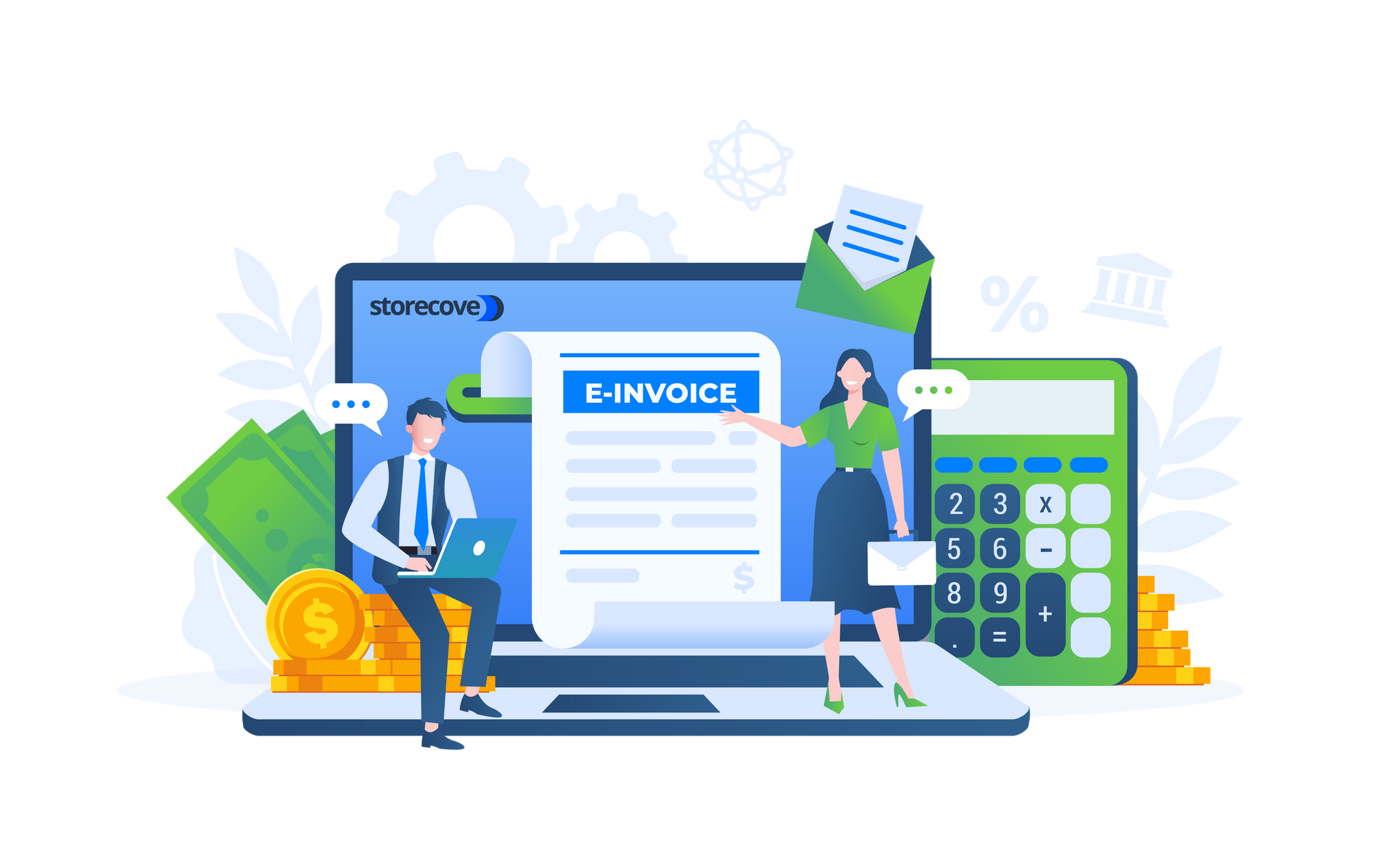Read everything you need to know about the XRechnung, a German e-invoicing format recently adopted for B2G invoicing in Germany.
Paper invoicing vs. Electronic invoicing
Paper invoices have long been the norm when doing business around the world. Unfortunately, paper documents introduce a wide range of challenges when doing business, because they are inherently incompatible with digital systems. Most companies have to process paper invoices manually, and they can only get these invoices digitized with a scanner.
Although there is software available that can automatically parse out information from most invoices, using this software introduces a significant possibility of errors occurring.
Paper invoices also fail to take advantage of the potential to exchange advanced electronic data automatically. Additionally, paper invoices take days to send through the mail, and they have to be managed at all stages using expensive manual processes.
Until very recently, companies have conventionally had to accept the continued use of outdated paper invoices because of the lack of electronic invoicing standards and the lack of legal acceptance.
Today, however, many governments and industry groups are working together to create and implement electronic invoicing standards that can make the replacement of paper invoices feasible.
XRechung is one of these invoicing standards, and it is rapidly gaining acceptance in Germany. Therefore, anyone seeking to do business with German companies or the German government should understand the importance of XRechung and how to use it effectively.
Read also: Use This Tool to Easily Comply With E-invoicing Regulations
Storecove is a company that specializes in helping EU-based businesses to send e-invoices in accordance with existing standards. The company can help businesses use XRechnung to maximum advantage. Get in touch with Storecove today for a free demo.
1. What Is XRechnung?
XRechung is an electronic invoicing standard that has been fully accepted by the German government since November 2020. The standard was created in alignment with European Standard 16931, an electronic invoicing standard that the EU approved in 2017.
Previously, national jurisdictions throughout the EU all had their own unique invoicing standards. This lack of standardization made doing business throughout the EU inefficient and inconsistent.
Although European Standard 16931 was approved for use throughout the EU, many companies have continued to rely on the national invoicing standards that have been the norm for decades.
Furthermore, European Standard 16931 gave individual nations substantial authority to develop their own variations of the EU standard. This was necessary because of the extent to which national invoicing standards are deeply rooted in the practical business world.
Consequently, German leaders began developing a domestic electronic invoicing standard to comply with the EU directive. The work of these planners was completed in November 2020 when full approval was issued for invoices in the XRechnung format.
Henceforth, all businesses billing German governmental agencies are expected to create invoices in compliance with this new German invoicing standard.

2. Why Use XRechnung Format
The German government is the largest invoice recipient in the German nation, and established German companies are also expected to begin using the standard.
Consequently, the XRechnung format is expected to become the most commonly used standard in Germany by the end of 2021. German companies engaged in business-to-business transactions will, therefore, need to learn how to use Germany's new invoice standard effectively.
Thankfully, German leaders spent over three years preparing the XRechnung format to be ideally suited for business applications. Thousands of hours of research were put into fine-tuning every aspect of the format to streamline doing business, make invoicing processes faster, and ensure that electronic invoices can be upheld in a court of law.
As a result, companies that adopt the new German invoicing standard can streamline their billing operations, reduce errors, and get paid sooner.
Support rich media and data files
The XRechnung format is especially advantageous because it makes it possible for businesses to communicate complex data as part of an invoice.
Unlike conventional paper invoices that only support basic data that can be written on a document, the new German invoicing standard can also support the transmission of rich media and data files.
Billed in a matter of minutes
Another key advantage of the new German standard is that it is designed for programmatic applications. Therefore, it can integrate with your ERP or CRM system automatically.
Standards have also been implemented for programmatic invoice creation and updating. As a result, invoices can evolve dynamically as a project progresses. In the future, this functionality could theoretically make it possible for clients to be billed in a matter of minutes after a job is complete.
Fully cloud-based
Documents can be retrieved remotely in the cloud, so they can be accessed from anywhere. Consequently, issues with physical documents needing to be securely mailed around the world can be eliminated.
Cloud-based invoice retrieval also makes it easier for multiple people and applications to access original invoice documents directly without needing to rely on copies. Having a master document that is retrieved in one place makes invoice amendments feasible in ways that were not possible in the past.
National expectations & compliance
Of course, the most significant reason to use the XRechnung format is that the format will be increasingly expected in the years ahead. Once the format has been fully adopted, companies that continue to bill their clients using older standards could be viewed as less competent.
Some businesses are likely to follow along with the German government's decision to require all vendors to use the new invoicing standard. If your business does not understand how to make the most of the new format, you could miss out on big accounts and risk losing existing clients.
The bottom line is that anyone seeking to do business in Germany needs to take the time to learn how to use the XRechnung format. Thankfully, plenty of information about the new invoicing standard has been published by the German government.
Additionally, tech companies, such as Storecove, are introducing solutions that make it easy for companies to make full use of Germany's new invoicing standard.

3. How Do You Create Invoices in XRechnung Format?
One of the main benefits of XRechnung is that it significantly reduces the need for negotiations when establishing an electronic data interchange invoicing process. Ordinarily, companies have to enter into bilateral agreements on what formats will be used for invoicing, where data will be stored, and how invoices can be modified.
The XRechnung format eliminates most of the need for negotiations by introducing standards that are easily accepted. Therefore, if you get a supplier or client to agree to use XRechnung, almost all of the specifics associated with creating invoices are built into the standard by default.
The XRechnung format is heavily dependent on ZUGFeRD, an EDI standard developed for communicating structured data in German markets. Using the EDI standard makes it possible for structured XML files to be sent directly between both parties in a transaction.
It is important to keep in mind that ZUGFeRD is not strictly based on data. If you communicate billing data with a supplier using this EDI standard, it is generally necessary to send a PDF file that contains embedded structured XML data.
Therefore, ZUGFeRD enables you to send an invoice to a client that looks exactly like an ordinary invoice, but the document comes with the data necessary to interpret the document programmatically without relying on optical character recognition.
One of the major advantages of XRechnung and ZUGFeRD is that these standards make it possible to send invoices in a flexible manner. ZUGFeRD documents can simply be emailed to a client.
As long as the German government's new standard is used in the right way, emails can completely replace paper documents. Conventionally, companies that adopted e-invoicing standards have still had to send separate paper documents for legal reasons. Sending two separate documents is redundant and introduces the possibility of serious discrepancies.
XRechnung also offers full support for De-mail, an email system developed for use within German markets. Additionally, support is offered for virtual post office standards, such as EGVP and VPN. These transmission systems are ideal for sending low volumes of PDF-based invoices.
Therefore, companies using the new German standard can send invoices in many different ways. XRechnung's flexibility makes it easy for small businesses and independent contractors to send relatively small invoices to clients without needing to use complex systems.
Of course, XRechnung also offers full support for EDI. Companies that make extensive use of ERP or CRM systems can benefit from sending invoices and data directly without relying on emails.
After all, emails can get misplaced, and it is highly beneficial for large organizations to have all of their invoices in one place. Making use of EDI offers a wide range of benefits that can add to a company's bottom line.

4. How To Send XRechnung Invoices to German Governmental Agencies?
XRechnung's protocols are based on thoughtful deliberation that took into account the overhead associated with getting an ERP system implemented. Consequently, if you have a small contract with the German authorities, you do not necessarily have to use EDI when sending out invoices. Instead, you can simply email your invoices to the email address mentioned in your contract.
Nevertheless, you will need to include structured data in emailed PDFs to comply with XRechnung. Providers in the e-invoicing industry, such as Storecove, can help you to sort out the specifics of formatting your XML data in a way that complies with the new German standard.
Using PEPPOL for B2G Invoicing in Germany
For larger deals, you will want to make use of the Pan-European Public Procurement Online system (PEPPOL), a cross-border invoicing standard that is supposed to be used throughout the EU.
In reality, the adoption of this invoicing standard has been very slow, and it is only in the early stages of being implemented in the practical business world. Nevertheless, XRechnung's reliance on PEPPOL means that the online system will become more common in the future.
Under XRechnung's standards, PEPPOL can be used to send invoices to any German government agency. If you are located outside of German jurisdiction, you may want to use the EU's online system to simplify working with a variety of clients in multiple national jurisdictions.
PEPPOL is also relatively user-friendly, so you can easily upload documents and data in a compliant manner. The best part about using PEPPOL's system is that it is highly secure, so you can avoid some of the security issues and uncertainty associated with emailing invoices to a client.
Connecting your ERP system
When sending compliant invoices to German agencies, you may want to make use of your ERP system.
Unfortunately, many of the leading ERP providers have not yet introduced interfaces that enable bi-directional invoice communication in accordance with the XRechnung format.
Consequently, you may need to use a third-party solution that connects to your ERP system to format and send data in the proper way.
Do you use an ERP system that is not yet connected to PEPPOL? Feel free to contact us so we can try to create a connection with your system.
Nevertheless, as time goes on, major ERP providers are expected to connect their own solutions to the PEPPOL network. As a result, you should keep an eye out for new ERP updates that could help to streamline your invoicing process.

5. How To Get Started?
Although German authorities invested considerable effort into making the XRechnung e-invoicing format as simple as possible, the reality is that using it in practical business applications is quite challenging.
If you do not format documents correctly, the consequences for your business can be severe. In general, authorities will give you the chance to amend documents and explain what elements of an invoice are not in the right format.
Nevertheless, authorities have the right to decline any invoice that is not formatted correctly. Therefore, failing to use XRechnung in the right way can harm your business by significantly delaying the receipt of payments.
Storecove is a company that specializes in helping EU-based businesses to send e-invoices in accordance with existing standards. The company can help businesses use XRechnung to maximum advantage.
Therefore, businesses can close more clients and get paid faster. Storecove's solutions also help to streamline billing processes, so the costs associated with managing an invoicing process can be significantly reduced.
Storecove works with all clients with invoicing needs, including vendors, service providers, and government agencies. The provider can help businesses to create invoices in ways that satisfy the requirements of government clients. Invoices can also be created for use in the private sector.
If you need to invoice clients in the EU, the reality is that Storecove is one of the best providers to count on. The company has a reliable track record of success, and it uses the right combination of technology solutions and one-on-one consultations to ensure that clients get ideal results.
Get in touch with Storecove today for a free demo.
More Information About The German XRechnung Format?
Contact us for more information or schedule a consult with one of our e-invoicing experts.
Read also:

Comments